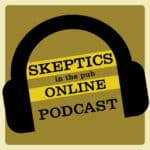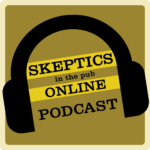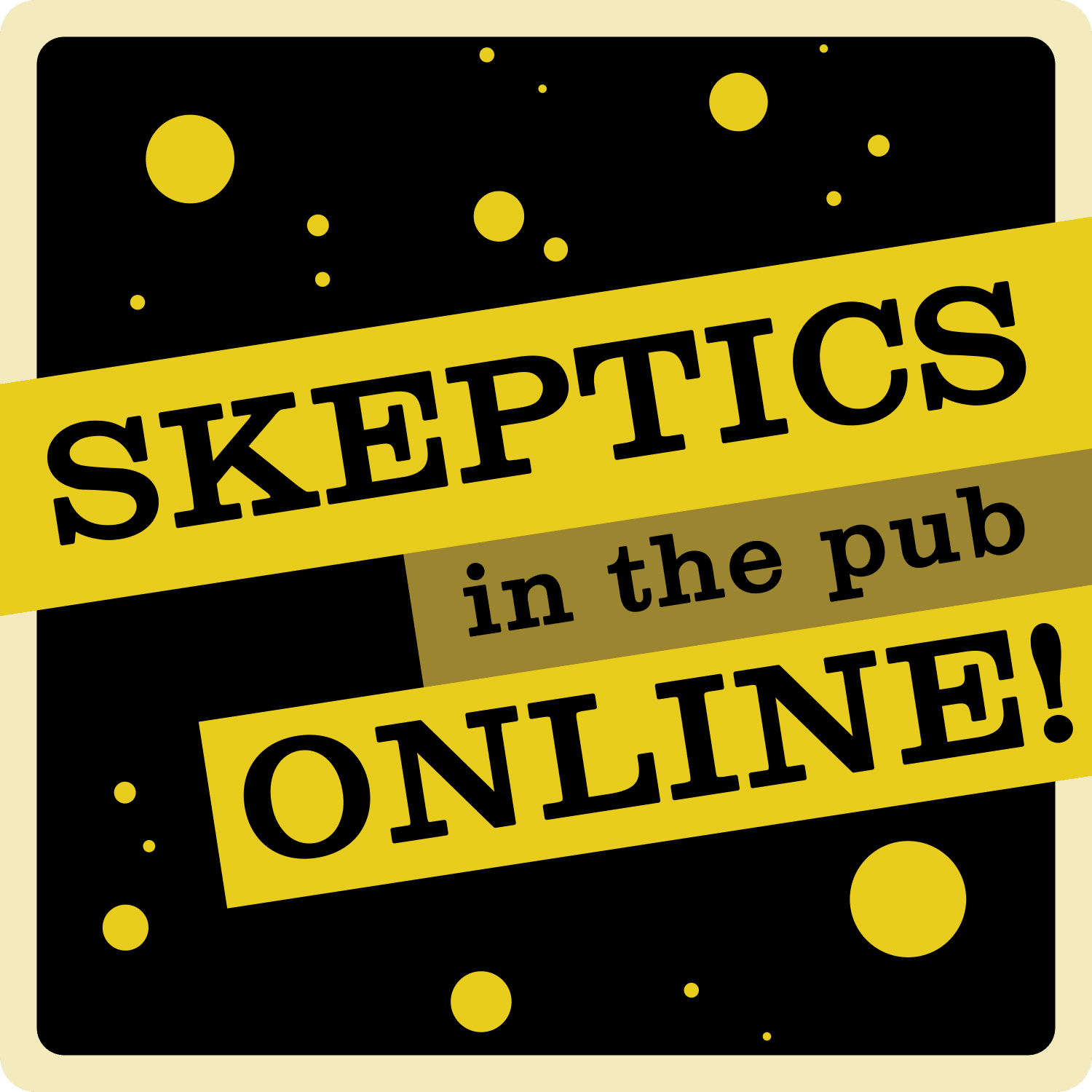This is the podcast version of the Skeptics in the Pub Online live-streamed talks. We take the audio and give it to you in a nice easy podcast feed for you to listen at your pleasure. All of the talks are still available on our YouTube channel if you want to see any visuals/slides/etc. We release the live shows as we do them on the 2nd and 4th Thursday of each month and on weeks when there isn't a live show, we release an episode from the archive.
Podcast
Too dangerous to publish? Navigating the high-stakes nature of AI research – Rosie Campbell

As AI becomes increasingly advanced, it promises many benefits but also comes with risks. How can we mitigate these risks while preserving scientific inquiry and openness? Who is responsible for anticipating the impacts of AI research, and how can they do so effectively? What changes, if any, need to be made to the peer review process? In this talk, we’ll explore these tensions and how they are playing out right now in the AI community. AI is not the first high-stakes, ‘dual-use’ field to face these questions. Taking inspiration from fields like cybersecurity and biosecurity, we’ll look at possible approaches to responsible publication, their strengths and limitations, and how they might be used in practice for AI.
Rosie Campbell leads the Safety-Critical AI program at the Partnership on AI, a multistakeholder nonprofit shaping the future of responsible AI. Her main focus is on responsible publication and deployment practices for increasingly advanced AI. Previously, she was Assistant Director of the Center for Human-Compatible AI at UC Berkeley, a Research Engineer at BBC R&D, and cofounder of Manchester Futurists. Her academic background spans physics, philosophy, and computer science. Rosie is also a productivity nerd and enjoys thinking about how to optimize systems, and how to use reason and evidence to improve the world.
The music used in this episode is by Thula Borah and is used with permission.
The Human Cosmos – Dr Jo Marchant

For most of human history, we have led not just an earthly existence but a cosmic one. Celestial cycles drove every aspect of our daily lives. Our innate relationship with the stars shaped who we are – our religious beliefs, power structures, scientific advances and even our biology. But over the last few centuries we have separated ourselves from the universe that surrounds us. And that disconnect comes at a cost. In her latest book, The Human Cosmos, Jo Marchant takes us on a tour through the history of humanity’s relationship with the heavens. We travel to the Hall of the Bulls in Lascaux and witness the winter solstice at a 5,000-year-old tomb at Newgrange. We visit Medieval monks grappling with the nature of time and Tahitian sailors navigating by the stars. We discover how light reveals the chemical composition of the sun, and we are with Einstein as he works out that space and time are one and the same. A four-billion-year-old meteor inspires a search for extraterrestrial life. And we discover why stargazing can be really, really good for us. It is time for us to rediscover the full potential of the universe we inhabit, its wonder, its effect on our health, and its potential for inspiration and revelation.
Jo Marchant is an award-winning science journalist. She has a PhD in genetics and medical microbiology from St Bartholomew’s Hospital Medical College, London, and an MSc in Science Communication from Imperial College. She has worked as an editor at New Scientist and Nature, and her articles have appeared in the Guardian, Wired, Observer, New York Times and Washington Post. She is the author of Decoding the Heavens, shortlisted for the Royal Society Prize for Science Books, and Cure, shortlisted for the Royal Society Prize for Science Books and longlisted for the Wellcome Book Prize.
The music used in this episode is by Thula Borah and is used with permission
The Patriarchs: How men came to rule – Angela Saini

Award-winning science journalist Angela Saini goes in search of the true roots of gendered oppression, uncovering a complex history of how male domination became embedded in societies and spread across the globe from prehistory into the present.
Travelling to the world’s earliest known human settlements, analysing the latest research findings in science and archaeology, and tracing cultural and political histories from the Americas to Asia, she overturns simplistic universal theories to show that what patriarchy is and how far it goes back really depends on where you are.
Despite the push back against sexism and exploitation in our own time, even revolutionary efforts to bring about equality have often ended in failure and backlash. Saini ends by asking what part we all play – women included – in keeping patriarchal structures alive, and why we need to look beyond the old narratives to understand why it persists in the present.
Angela Saini is an award-winning journalist based in New York, known globally for her work on race and gender. She has presented science programmes on BBC radio and television, and her writing has appeared in National Geographic, Wired, the Lancet and Nature. She is the author of four books, including Superior: The Return of Race Science, which was a finalist for the LA Times Book Prize and Inferior: How Science Got Women Wrong, which has been translated into fourteen languages. Both are on university reading lists across the world. Her latest book The Patriarchs, on the origins of patriarchy, has been hailed as a highlight for 2023 by the Financial Times, Guardian and New Statesman. Angela has a Masters in Engineering from the University of Oxford and has been a Fellow at the Massachusetts Institute of Technology and the Humboldt Foundation in Berlin. In 2020 she was named one of the world’s top 50 thinkers by Prospect magazine. She has delivered distinguished lectures and keynotes at Oxford, Yale, Princeton and CERN in Geneva.
The music used in this episode is by Thula Borah and is used with permission.
Planetary Protection: Guardians of the Galaxy or lame science-party poopers? – Dr Jennifer Wadsworth

What is planetary protection? Is it even important? Because it sounds like it’s either an incredibly exciting space battle strategy from Independence Day or an exceedingly dull health and safety class that future generations will be subjected to. In reality it’s kind of both (except that thankfully it’s not from Independence Day). I’m a space scientist who recently finished my postdoc at NASA Ames Research Center, California, where I spent my time developing new ideas to help in the often-overlooked field of planetary protection. I’ll (hopefully) convince you of its importance for our continued exploration of the solar system and how it can even be applied to help solve some of our problems here on Earth.
Jennifer Wadsworth is an astrobiologist who did her PhD at the University of Edinburgh and recently completed her postdoc at NASA Ames Research Center, California. She’s particularly interested in how microbes can survive extreme radiation environments … or not, as the case may be! She enjoys long walks on the beach, and subjecting bacteria to a plethora of lethal conditions. For science.
Lost and found in the Science of Emotion – Dr Dean Burnett

Why can’t we think straight when hungry? What’s the point of nightmares? And why can’t we forget embarrassing memories?
Emotions can be a pain. After losing his dad to Covid-19, Dean Burnett found himself wondering what life would be like without them. And so, he decided to put his feelings under the microscope – for science.
In this talk, Dean takes us on an incredible journey of discovery, stretching from the origins of life to the end of the universe. Combining expert analysis, brilliant humour and powerful insights into the grieving process, Dean uncovers how, far from holding us back and restraining logic and reason, our emotions make us who we are and allow us to think at all.
Dean Burnett, neuroscientist, lecturer, author, blogger, podcaster, pundit, science communicator, comedian and numerous other things, depending on who’s asking and what they need. Previously employed as a psychiatry tutor and lecturer at the Cardiff University Centre for Medical Education, Dean is currently an honorary research associate at Cardiff Psychology School, as well as a Visiting Industry Fellow at Birmingham City University.
The music used in this episode is by Thula Borah and is used with permission.
Unidentified Flying Objects: Are there any images that require an extraterrestrial explanation – Dr Steve Barrett

As a Senior Research Fellow in the Department of Physics, my research interests span all aspects of imaging, image processing and image analysis. This includes medical imaging (biophysics), scanning probe microscopy of atoms, molecules and surfaces (nanophysics), microscopy of earth materials (geophysics) and astrophotography.
The music used in this episode is by Thula Borah and is used with permission.
A critical perspective on what cognitive science can tell us about first impressions and stereotypes – Dr Lou Safra

In this talk, I will present the key findings on first impressions and stereotypes offered by cognitive science. By presenting the main experimental designs that are used to product these results, I will question the limits and issues of this research and discuss how we can ensure a safe use of these results
Lou Safra holds a PhD in cognitive science awarded by the Ecole Normale Supérieure, Paris in 2017. She is currently assistant professor in political psychology at CEVIPOF-Sciences Po and an associate researcher at the Institut d’Études Cognitives (Laboratoire de Neurosciences Cognitives & Laboratoire de Neurosciences Cognitives et Computationelles, École Normale Supérieure, Paris).
The music used in this episode is by Thula Borah and is used with permission.
How to Make the World Add Up – Ten Rules for Thinking Differently About Numbers – Tim Harford

When was the last time you read a grand statement, accompanied by a large number, and wondered whether it could really be true? Statistics are vital in helping us tell stories – we see them in the papers, on social media, and we hear them used in everyday conversation – and yet we doubt them more than ever.
But numbers – in the right hands – have the power to change the world for the better. Contrary to popular belief, good statistics are not a trick, although they are a kind of magic. Good statistics are not smoke and mirrors; in fact, they help us see more clearly. Good statistics are like a telescope for an astronomer, a microscope for a bacteriologist, or an X-ray for a radiologist. If we are willing to let them, good statistics help us see things about the world around us and about ourselves – both large and small – that we would not be able to see in any other way.
In How to Make the World Add Up, Tim Harford draws on his experience as both an economist and presenter of the BBC’s radio show More or Less. He takes us deep into the world of disinformation and obfuscation, bad research and misplaced motivation to find those priceless jewels of data and analysis that make communicating with numbers worthwhile. Harford’s characters range from the art forger who conned the Nazis to the stripper who fell in love with the most powerful congressman in Washington, to famous data detectives such as John Maynard Keynes, Daniel Kahneman and Florence Nightingale. He reveals how we can evaluate the claims that surround us with confidence, curiosity and a healthy level of scepticism.
Using ten simple rules for understanding numbers – plus one golden rule – this extraordinarily insightful book shows how if we keep our wits about us, thinking carefully about the way numbers are sourced and presented, we can look around us and see with crystal clarity how the world adds up.
Tim is an economist, journalist and broadcaster. He is author of The Next Fifty Things That Made the Modern Economy, Messy, and the million-selling The Undercover Economist. Tim is a senior columnist at the Financial Times, and the presenter of Radio 4’s More or Less, the iTunes-topping series ‘Fifty Things That Made the Modern Economy’, and the new podcast ‘Cautionary Tales’. Tim has spoken at TED, PopTech and the Sydney Opera House. He is an associate member of Nuffield College, Oxford and an honorary fellow of the Royal Statistical Society. Tim was made an OBE for services to improving economic understanding in the New Year honours of 2019.
The music used in this episode is by Thula Borah and is used with permission.
Women, Wellness, and Woo – Dr Alice Howarth

We all want to be well, right? Whether you’re a bit run down and just need a pick me up to get through the next working week, you’re suffering symptoms of a long-standing condition that you just can’t figure out or you’re reaching an age where you want security in your long-term health.
The wellness industry has become ever more popular in an age where chronic illnesses can go undiagnosed for years and access to medical support for mental ill-health is either prohibitively expensive or subject to long wait times. Women and other marginalised people are sometimes dismissed or overlooked in healthcare – where resources are already stretched and spending time really listening to a patient can be difficult even without biases.
To fill the gap, we often turn to the wellness industry; an amorphous, indefinable collection of well doers, businesses and practitioners who offer patients control over their health, empowerment to make medical choices that suit their needs and the gentle ear of a practitioner who’s always willing to listen.
But does the wellness industry really provide answers? Are women really empowered by the range of choices available to them? Is there really a solution to “wellness”?
Dr Alice Howarth is a scientist and skeptic who is also disabled and chronically ill. She’s spent years navigating the healthcare system while trying to learn how to manage her health conditions at the same time as working in academia and juggling a bunch of roles in the skeptical community. As a podcaster with Skeptics with a K and writer for The Skeptic, Alice has researched a wide variety of wellness industry hacks and products and practitioners, and the reasons people might feel encouraged to make use of them.
The music used in this episode is by Thula Borah and is used with permission.
Food Therapy: How our psychology affects how we eat – Pixie Turner

How does food make you feel? We need food to survive, but often we don’t stop to think about why we eat the way we do. From birth, we are shaped by our early psychological environment, which ultimately affects what, where, when, and why we eat. Are your parents really to blame for everything? Can you actually eat your way out of depression? Or is it perhaps a bit more complicated than that.
Pixie Turner is a registered nutritionist (RNutr) and psychotherapist (MBACP), and director of The Food Therapy Centre, where she specialises in food and body image issues. She is the author of several books, including ‘Food Therapy’ which was released this year. In 2020–21, she co-hosted (alongside cardiothoracic surgeon Nikki Stamp) ‘In Bad Taste’, a podcast that casts a critical eye over the content and claims of health documentaries.
The music used in this episode is by Thula Borah and is used with permission.
